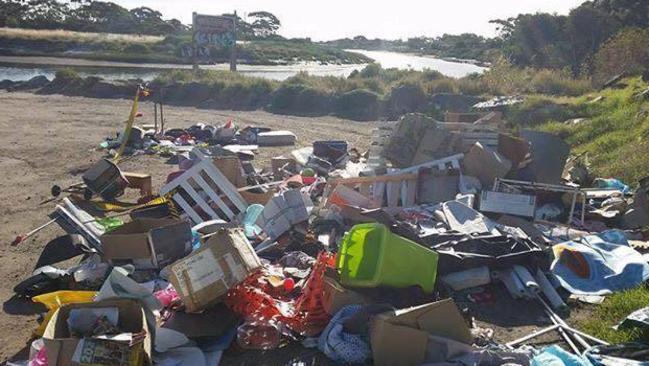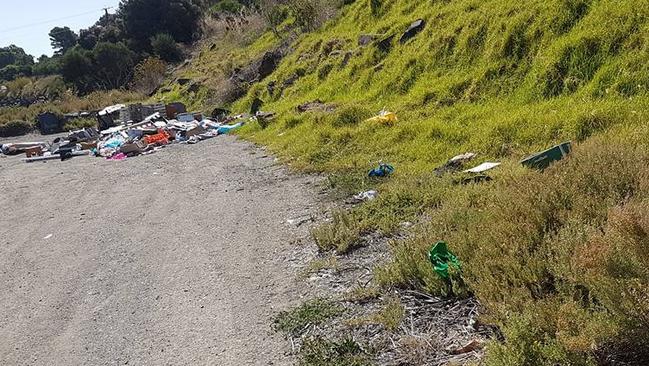This, in one of the world’s most liveable cities? The disgraceful dumping of rubbish by river
ADELAIDE’S been touted as one of the most liveable cities in the world – but this is the disgraceful state in which a river bank in the south has been left.

South
Don't miss out on the headlines from South . Followed categories will be added to My News.
- Illegal dumping on the rise in Holdfast Bay after council cuts free hard-rubbish pick-ups in half
- Dumping hard rubbish illegally? Prepare to be named and shamed
- The Adelaide house no one should have to live next door to
THE banks of the Onkaparinga River south of Adelaide — the fifth most liveable city in the world — have become a dumping ground for household rubbish.
Broken furniture, old linen, boxes of paper and various plastics are among the items that have been strewn by the river in a disgraceful display of disregard for the environment.
The rubbish pictured here was dumped at the Onkaparinga River Recreation Park, next to the Seaford train line.
It was cleaned up only for a new pile to be left.

In 2016 Adelaide tied with Calgary in Canada for fifth spot in the Economist Intelligence Unit’s livability index — the fifth year in a row Adelaide finished in this top-five ranking.
Onkaparinga city services director Alison Hancock said the council was investigating the incidents with the help of the Environment Department as it was on government land.
The incidents have raised questions about the price of dumping fees at waste depots.
The council’s website says all six of the waste disposal sites in the region are privately owned and operated.
Ms Hancock said dumping fees start at $43 depending on the type of waste. It includes a state government levy.
“However, many items found disposed of illegally can be recycled using the fortnightly collection service or by taking them to your local recycling depot,” Ms Hancock said.
Friends of Onkaparinga Park secretary Andy McKinnon said people had been dumping their rubbish within the recreation park for years, particularly around Piggot Range Rd on the northern side of the gorge.
“Because it’s quite isolated and there’s houses nearby, people just think it’s an easy way to get rid of it,” Mr McKinnon said.
“Dump fees are expensive, there’s no doubt about that, but there are other ways.
“I don’t think there’s any real excuse for it.”
He urged residents to use the council’s two hard waste pick-up services a year for larger materials.
“We don’t want to have to spend our time picking up rubbish and I’m sure the National Parks (rangers) don’t want to either,” Mr McKinnon said.
He warned it was also dangerous for wildlife if the rubbish was washed down the river into the ocean.
Onkaparinga protester Bev Adams took to the council’s Facebook page last month to complain about dumping fees after she was charged $85 to empty half a small trailer.
“Two hard rubbish collections per year, rubbish bin police and ridiculous council fees — where else can you dispose of it?” she said.
Penalties for littering or illegally disposing of waste were increased on February 1 when the new Local Nuisance and Litter Control Act 2016 came into effect.
Under the regulations, anyone caught dumping more than 50 litres of general waste, which includes cigarette butts, used syringes or glass, faces prosecution.
The range of penalties includes a maximum fine of $30,000 or imprisonment, or a $1000 expiation.
The State Government’s new Dob in a Litterer program also allows people to report illegal dumping if they have seen it through a mobile phone app.
The Environment Protection Authority can then prosecute offenders to deter littering.
The council is also conducting a hard waste collection service review to limit dumping.



